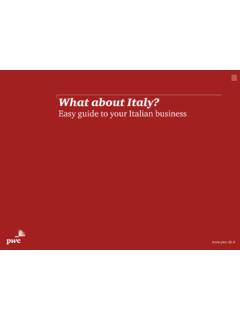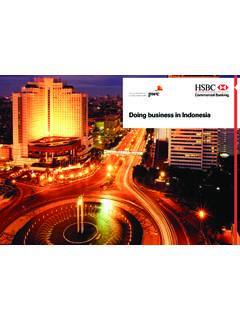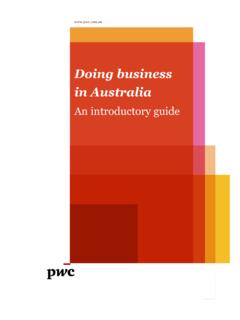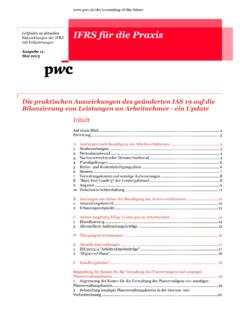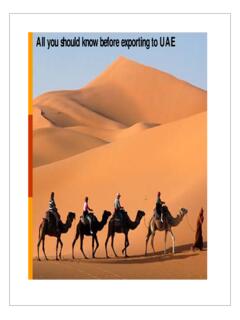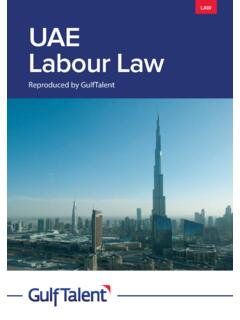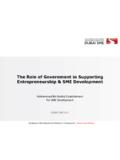Transcription of Doing business in the UAE - PwC
1 This publication is a joint project withDoing business in the UAEE xecutive summary 4 Foreword 6 Introduction Doing business in the UAE 8 Conducting business in the UAE 14 Taxation in the UAE 18 Audit and accountancy 22 Human Resources and Employment Law 24 Trade 38 Banking in the UAE 40 HSBC in the UAE 42 Country overview 44 Contacts 46 DisclaimerThis document is issued by HSBC Bank Middle East Limited (the Bank ) in the UAE, which is regulated by the Jersey Financial Services Commission, in partnership with PricewaterhouseCoopers (PwC). This document is not intended as an offer or solicitation for business to anyone in any jurisdiction. It is not intended for distribution to anyone located in or resident in jurisdictions which restrict the distribution of this document.
2 It shall not be copied, reproduced, transmitted or further distributed by any information contained in this document is of a general nature only. It is not meant to be comprehensive and does not constitute financial, legal, tax or other professional advice. You should not act upon the information contained in this publication without obtaining specific professional advice. This document is issued by the Bank together with PricewaterhouseCoopers ( PwC ). Whilst every care has been taken in preparing this document, neither the Bank nor PwC makes any guarantee, representation or warranty (express or implied) as to its accuracy or completeness, and under no circumstances will the Bank or PwC be liable for any loss caused by reliance on any opinion or statement made in this document.
3 Except as specifically indicated, the expressions of opinion are those of the Bank and/or PwC only and are subject to change without notice. This document is not a 'Financial Promotion'. The materials contained in this publication were assembled in August 2012 and were based on the law enforceable and information available at that This document seeks to provide a general overview of the united arab emirates ( UAE ) for investors (corporates and individuals) who are looking to establish business in the UAE. The UAE comprises of a Federation of seven emirates namely, Dubai, Abu Dhabi, Sharjah, Fujairah, Ras Al-Khaimah, Umm Al-Quwain and Ajman which have their own rules and regulations. This document covers several considerations that may generally apply in all of these emirates and can be considered by foreign investors in evaluating the prospects of operating and investing in the UAE.
4 These include the economy, regulatory framework, tax aspects, audit and accountancy, human resource and employment issues, trade and banking. When considering Doing business in a foreign country, any investor needs to consider a range of commercial issues that influence the decision of setting up in a country. The UAE could be an attractive hub for investors to locate their business interests for the following reasons: The UAE has one of the most liberal trade regimes in the Gulf region and attracts strong capital flows from across the region; UAE is focussed on economic diversification in trade, logistics, banking, tourism, real estate and manufacturing and provides opportunities in various industries; UAE has a well-established infrastructure, strong banking system and a stable political system; Although there are restrictions on company ownership by non-GCC nationals, the UAE also provides for a window of free trade zones that can allow 100% foreign ownership and a nil taxation regime (subject to certain limitations).
5 UAE provides a tax favourable environment for most industries; There are a high number of expatriate workers at all levels of the economy such that expatriates accounts for over 80% of the work force; There are no exchange control restrictions and it is possible to have unrestricted repatriation of income and capital; UAE s culture is driven by Islamic traditions, however, with over 150 nationalities, expatriates are able to practise their own cultures; and UAE provides a safe and secure family environment with one of the lowest crime rates in the world. This document contains further details on key matters that investors should consider when exploring whether to operate in the UAE. We hope that the document provides you with a useful initial overview of the key matters to consider when setting up in the UAE.
6 Executive summary6 HSBC has a proud tradition of long-term investment and commitment to the countries in which it conducts business . This tradition has allowed HSBC to build deep and trusted relationships with individuals, companies, government departments and ruling families. It has also helped HSBC understand how our business principles can best be complemented by giving back in appropriate ways to the communities in which we 64 years HSBC has supported local UAE businesses, and foreign investors coming to the country to establish new ventures. Their combined success has propelled the UAE to new heights, establishing it as the centre for trade and finance in the region. In recent years, HSBC has witnessed strong growth in demand from UAE businesses for assistance and support as they expand overseas.
7 In parallel, major multinational companies have made the strategic choice to relocate businesses and regional Head Office functions to the country, a true testament to the quality and confidence in the future of their investment decisions. Today, as ever, HSBC stands ready to support the country s next phase of economic growth and , we believe that business and society are interdependent, and that strong economic growth requires an educated society and skilled workforce living in a healthy and sustainable environment. This belief has driven us at a fundamental level to support not only financial but also social development. The volunteer work that our staff carry out to support their local communities has become as much a part of our business principles as financial strength and acumen.
8 Focused on educational and environmental programmes, HSBC and its staff work hand-in-hand with UAE and global institutions in creating awareness and understanding through education and experience. HSBC s commitment to social responsibility will continue to grow over the long term, with time and funding provided to volunteers to engage in and support this tradition of giving back to the community. ForewordAbdulfattah SharafChief Executive Officer UAE HSBC Bank Middle East Limited8 Economic environment The united arab emirates ( the UAE/country ) is in the Middle East, bordering the Gulf of Oman and the Arabian Gulf, between Oman and Saudi Arabia. The UAE has an open economy with a high per capita income and a sizeable annual trade surplus.
9 With Abu Dhabi and Dubai as its dual financial centres, the UAE has long commanded economic superiority in the GCC. Successful efforts at economic diversification in trade, logistics, banking, tourism, real estate and manufacturing have reduced the portion of GDP based on oil and gas output to 25%. Since the discovery of oil in the UAE more than 31 years ago, the UAE has undergone a profound transformation from an impoverished region of small desert principalities to a modern state with a high standard of living. The government has increased spending on job creation and infrastructure expansion and is opening up utilities to greater private sector involvement. The country s Free Trade Zones offering 100% foreign ownership and zero taxes are helping to attract foreign investors.
10 The global financial crisis, tight international credit, and deflated asset prices constricted the economy in 2009 and 2010. UAE authorities have tried to blunt the crisis by increasing spending and boosting liquidity in the banking sector. The crisis hit Dubai hardest, as it was heavily exposed to depressed real estate prices. In February 2009, Dubai launched a US$20bn bond programme to meet its debt obligations. The Central Bank of the UAE and Abu Dhabi-based banks bought the largest proportion of these bonds. In December 2009, Dubai received an additional US$10bn loan from the emirate of Abu Dhabi. Dependence on oil and on a large expatriate workforce are significant long-term challenges. Currently, the UAE economy is recovering from the previous headwinds, driven by a pick-up in trade, tourism and public spending, and supported by higher oil prices.






